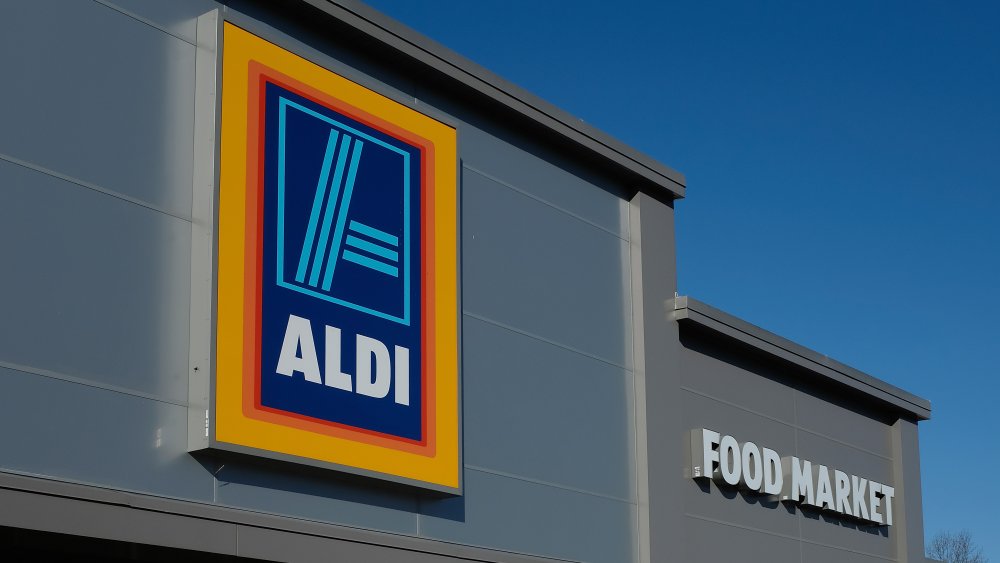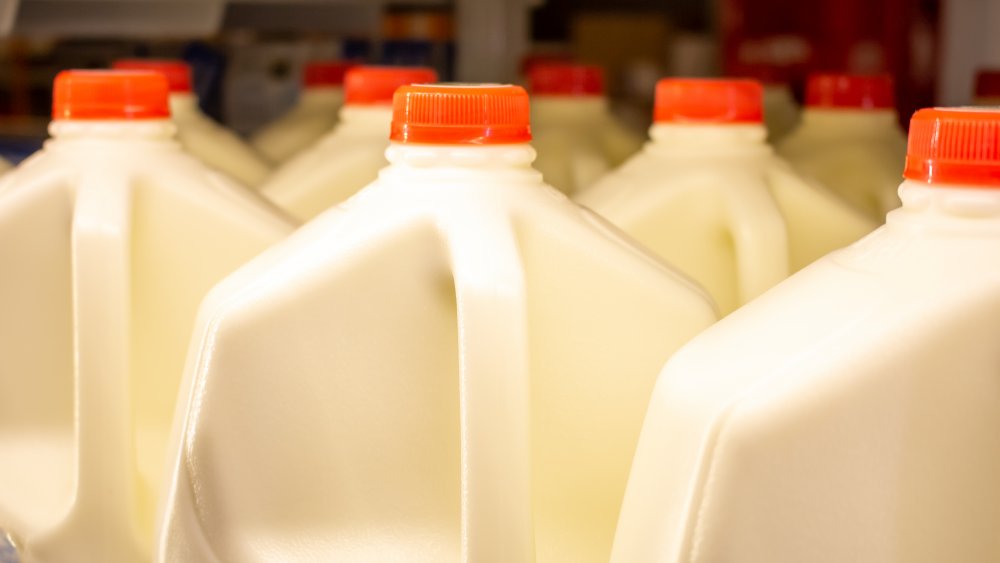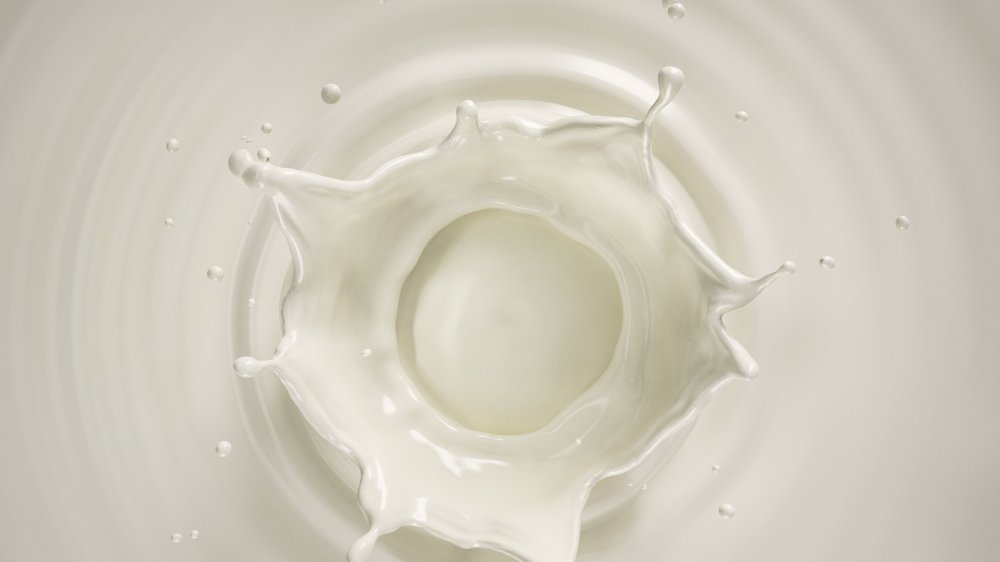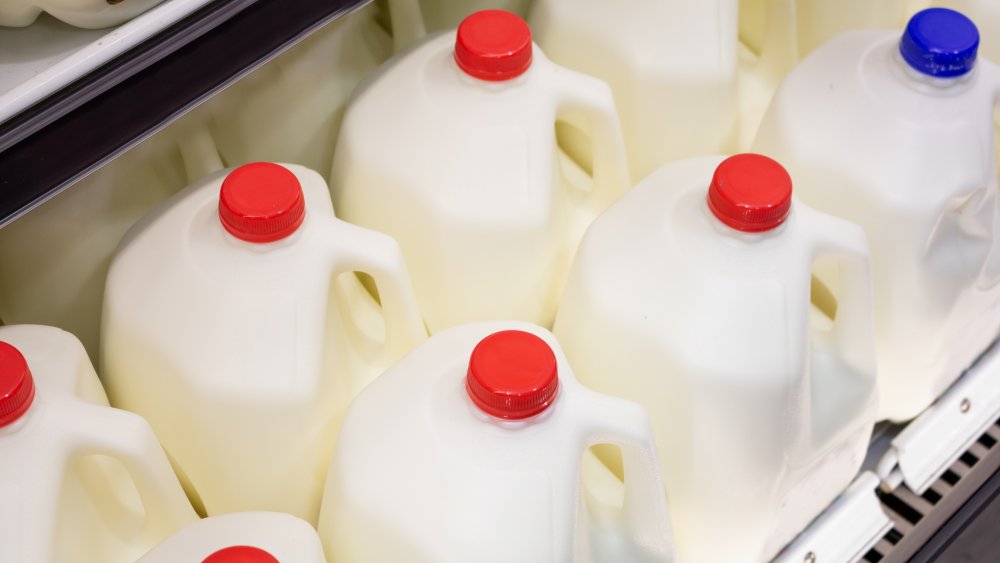The Real Reason Aldi's Milk Is So Cheap
You know you're onto something when a competitor's CEO — namely Walmart US President Gregory Foran — calls you "fierce" and "good." And Walmart ought to know. Since Aldi arrived in the US as a single store in Iowa back in 1976, the store has grown, slowly and steadily, to become the third largest grocery chain in the country (behind Walmart and Kroger) with more than 1,800 shops in 35 states across the country. Unless things change, Aldi is aiming to have 2,500 stores by the end of 2022 (via CNN).
Shopping at Aldi is a no-frills experience that begins with shopping carts, which are only available if you pay a quarter. It has just four to five grocery aisles that carry about 1,300 supermarket essentials (normal supermarkets have about 30,000 items), no shopping bags, and check-out staff that send you off to do your own bagging. And if you want your quarter back, you have to take your cart back to where you found it, which means Aldi doesn't have to keep staff on hand to chase carts down for you (via Capital Strategies). All these measures add up, allowing Aldi to both keep its overheads down and to price its goods competitively for the benefit of its customers. But the price of milk at Aldi is so low, we can't help but wonder whether the chain is compromising on the quality of the milk it sells.
Aldi sells milk under a private label, which allows it to source milk at a lower cost
Everything at Aldi is built to maximize efficiency, because time equals money. Aldi offers its customers scant dairy options, which paradoxically helps them make quick, decisive purchases — because the more choices we have in front of us, the less inclined we actually are to spend, aka choice paralysis (via Forbes). Aldi's customers get just one brand of milk: its private label, Friendly Farms, while dairy products like yogurt and dairy alternatives such as soy milk are sold under the Simply Nature label. Private labels (which is a fancy way to refer to generics) allow retailers to sell product without having to pay a middleman, which makes things cheaper for the consumer. And consumers these days, no matter where they are, are looking to save where they can.
Though just because Aldi sells a private label, don't assume it is second-rate. The high quality of its Friendly Farms milk means its stocks sells out so quickly, stores are restocked between 5-7 times a week — which is also how often Aldi restocks meat and produce. To further save on labor costs, the milk arrives on racks so that 80 gallons are shelved and ready to be sold in just seconds (via Frugal Bites). Aldi's business decisions in the dairy section mean there is little to no spoilage, which would otherwise represent both lost investment and lost profit (via Go Codes).
Aldi doesn't source its milk from questionable sources, even if it is inexpensive
Aldi has benefited financially overall from changing consumer attitudes toward buying non-branded grocery labels, which were once seen as inferior, simply because they were cheaper. Megan Doyle, head of consumer research group Canstar Blue, says shoppers are trending toward generic brands over name brands, which is a boost for the bottom line of grocers like Aldi.
"Unless you have a strong preference for a particular named brand, chances are you will perceive the private label alternative to offer better value. You need to be convinced that a big name brand is superior in quality to spend the extra money. With private label products improving, the difference in quality seems to be narrowing and consumers are simply following the cheaper prices. Private labels have traditionally been seen as the cheap and nasty alternatives, but perceptions are changing and consumers are switching to save. There has been a huge change in attitudes in a short space of time," she says.
Aldi's low-cost model means it's markup on the price of its milk is lower
Aldi's milk isn't cheap because the company's buyers are savvy negotiators. Like all commodities, the price of milk is dictated by supply and demand, and the market price of milk has been hit badly by a falling demand for cow's milk, which has lasted several years. In 1984, milk represented 15 percent of the food and drink consumed during any meal, but by 2019, that share dropped to just 9 percent (via CNBC).
Beyond the low market value of milk across the board these days, another key factor that dictates prices is the retail markup that stores add to the base price of milk. This markup helps retailers cover the cost of doing business, because it factors in rent, utilities, labor, costs, and insurance (via The Balance Everyday). This also explains why a gallon of milk is pricier at more exclusive groceries like Whole Foods (where the company puts more money into the shopping experience), and why Aldi's low-cost business model has a significant impact on the price of its milk compared to its competitors. In 2019, a price check by editors at Cheapism showed that a gallon of 2 percent milk cost $2.48 in Walmart, and $1.49 in Aldi.
So thanks to low bulk milk prices and Aldi's streamlined, no-frills shopping experience, Aldi is able to offer us good milk for as much as a dollar less than competitors — all without compromising its bottom line.



